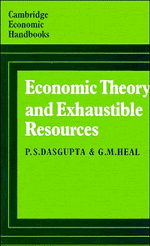Book contents
- Frontmatter
- PREFACE
- Contents
- Chapter 1 A PREVIEW
- Chapter 2 RESOURCE ALLOCATION IN A TIMELESS WORLD
- Chapter 3 EXTERNALITIES
- Chapter 4 INTERTEMPORAL EQUILIBRIUM
- Chapter 5 RENEWABLE RESOURCES: SOME ECOLOGICAL AND ENVIRONMENTAL MODELS
- Chapter 6 EXHAUSTIBLE RESOURCES: AN INTRODUCTION
- Chapter 7 PRODUCTION WITH EXHAUSTIBLE RESOURCES
- Chapter 8 RESOURCE DEPLETION AND CAPITAL ACCUMULATION IN A COMPETITIVE ECONOMY
- Chapter 9 MEASURABILITY, COMPARABILITY AND THE AGGREGATION OF INTERGENERATIONAL WELFARES
- Chapter 10 THE OPTIMAL DEPLETION OF EXHAUSTIBLE RESOURCES
- Chapter 11 IMPERFECT COMPETITION AND EXHAUSTIBLE RESOURCES
- Chapter 12 TAXATION OF EXHAUSTIBLE RESOURCES
- Chapter 13 UNCERTAINTY, INFORMATION AND THE ALLOCATION OF RISK
- Chapter 14 UNCERTAINTY AND THE ALLOCATION OF RESOURCES
- Chapter 15 PRICE MOVEMENTS IN RESOURCE MARKETS
- Chapter 16 CONCLUSIONS
- BIBLIOGRAPHY
- INDEX
Chapter 1 - A PREVIEW
Published online by Cambridge University Press: 04 April 2011
- Frontmatter
- PREFACE
- Contents
- Chapter 1 A PREVIEW
- Chapter 2 RESOURCE ALLOCATION IN A TIMELESS WORLD
- Chapter 3 EXTERNALITIES
- Chapter 4 INTERTEMPORAL EQUILIBRIUM
- Chapter 5 RENEWABLE RESOURCES: SOME ECOLOGICAL AND ENVIRONMENTAL MODELS
- Chapter 6 EXHAUSTIBLE RESOURCES: AN INTRODUCTION
- Chapter 7 PRODUCTION WITH EXHAUSTIBLE RESOURCES
- Chapter 8 RESOURCE DEPLETION AND CAPITAL ACCUMULATION IN A COMPETITIVE ECONOMY
- Chapter 9 MEASURABILITY, COMPARABILITY AND THE AGGREGATION OF INTERGENERATIONAL WELFARES
- Chapter 10 THE OPTIMAL DEPLETION OF EXHAUSTIBLE RESOURCES
- Chapter 11 IMPERFECT COMPETITION AND EXHAUSTIBLE RESOURCES
- Chapter 12 TAXATION OF EXHAUSTIBLE RESOURCES
- Chapter 13 UNCERTAINTY, INFORMATION AND THE ALLOCATION OF RISK
- Chapter 14 UNCERTAINTY AND THE ALLOCATION OF RESOURCES
- Chapter 15 PRICE MOVEMENTS IN RESOURCE MARKETS
- Chapter 16 CONCLUSIONS
- BIBLIOGRAPHY
- INDEX
Summary
1. The role of natural resources in the functioning of an economic system has received intermittent attention from economists. The classical economists of the nineteenth century were very much concerned with this issue: both Malthus and Ricardo saw in a country's land the key to many characteristics of its economy. However, in the considerable developments of economic theory that have occurred in the twentieth century, there has been little explicit mention of natural resources. These differences are perhaps not surprising. In the eighteenth and nineteenth centuries, the ownership and productivity of land were evidently of great importance in determining the distribution of income, and the timing and location of the industrial revolution in the United Kingdom were clearly influenced by the exhaustion of certain traditional resource supplies and the availability of alternatives. To nineteenth-century man, it would therefore have seemed unthinkable that one could explain the dynamics of an economy, or analyse the processes of production and exchange, without giving special attention to the role of natural resources.
The economic theorists of the twentieth century have, however, proceeded on the basis of just such an omission, at least until recently: in the works that have exercised a dominant influence on the evolution of economic theory in the last half century—Hicks's Value and Capital, Samuelson's Foundations of Economic Analysis and the developments of the Arrow—Debreu model—there are few explicit references to natural resources.
- Type
- Chapter
- Information
- Economic Theory and Exhaustible Resources , pp. 1 - 10Publisher: Cambridge University PressPrint publication year: 1980
- 2
- Cited by

